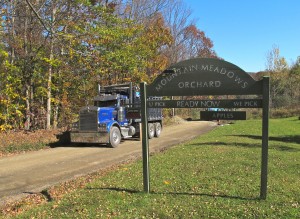After Pa. couple discovers plan to drill on unleased land, energy company cancels permit
-
Katie Colaneri

Katie Colaneri/StateImpact Pennsylvania
Joyce and Steve Libal run an orchard out of their 63-acre home in Apolacon Township, Susquehanna County.
It all started with beans.
Joyce and Steve Libal run a small orchard on their 63-acres in Little Meadows, Susquehanna County where they sell fruit and organic vegetables.
One day in early September, a friend came by to purchase ten pounds of green bush beans.
“In this area, with all the drilling going on, the conversations usually end up talking about the gas industry,” Steve Libal says. “And he just brought up that he had seen, he’s a borough councilman and they received a packet of information about a well pad behind our house.”
A map the gas company, Talisman Energy, sent to the municipality shows a plan for a well pad just beyond the thick row of trees at the back of their property. A dotted line shows a well bore moving 2,000 feet across their land. (You can see the map below.)
“I just thought this has to be some sort of horrible mistake,” Joyce said. “Someone made a mistake and we have to enlighten them so they can fix it.”
The couple contacted the Department of Environmental Protection. A geologist for the DEP who was reviewing the well permit said he would let Talisman Energy know about the situation.
Just hours after getting the e-mail from the DEP, they got a call from a landman asking them what it would take for them to sign a lease with Talisman.
It turns out that when the DEP is evaluating a well permit, it doesn’t have to check whether the gas company has secured drilling rights to the land being applied for. In an e-mail to the Libals from the geologist reviewing the permit, Brian Babb with the DEP’s legal department wrote “the Department does not concern itself with lease issues on wells that are not subject to the Conservation Law.”
The DEP approved Talisman Energy’s permit and informed the couple they had 30 days to appeal to the Environmental Hearing Board.
That left the Libals with two choices: they could hire a lawyer to appeal or they could consider signing a lease.
Wrestling with the leasing question for five years
The Libals say several companies have contacted them over the last five years. At first, they always said no. But as more of their neighbors leased their properties for drilling, the couple agreed they would only look at a lease if they could get a good rate and if it didn’t involve disturbing anything on the surface of their property.
“If a lease actually met these basic minimal requirements for us to look at it, does that mean we would actually write our names down on that paper? It would definitely be the hardest thing in our lives to do that, so I don’t know,” Joyce Libal says.
April Crane, a spokeswoman for Talisman Energy says there’s a difference between the permitting process and the drilling process. In other words, just because the company has a permit, doesn’t mean the company intended to drill without getting a valid lease. Talisman could not tell StateImpact Pennsylvania by press time whether or not this is a common practice for the company.
“Ultimately, Talisman didn’t do anything wrong,” says Jackie Root, President of the Pennsylvania Chapter of the National Association of Royalty Owners. “They didn’t trespass on anybody’s property and they, I believe, would not have drilled that lateral without having a lease in place.”
A need to expand Pa.’s drilling law?
Root is known as the “gas well guru” and has made a living helping landowners in the Marcellus Shale region negotiate leases through her consulting business. She has a lease with Talisman herself and says energy companies have to be cautious because drilling without permission would be a very expensive error.
But Joyce and Steve Libal say landowners should be protected. Pennsylvania’s drilling law known as Act 13 requires companies to notify landowners if their water wells are within 3,000 feet of the proposed well pad. They also send information packets like the one the Libals’ friend received to the municipality where the well pad is being built and to neighboring municipalities. The Libals want those laws expanded to include all the potential landowners involved.
“Certainly the landowners whose land is being used for the well should receive a copy of the map and know that well is being applied for. It’s outrageous that that isn’t already happening,” Joyce Libal says.
Root thinks that could add unnecessary layers of regulation for energy companies. She says landowners, whether they have leases or not, need to take some responsibility.
“The reports are available, so if the landman comes to you and tells you something and this report is issued that shows the well bore going [under your property] – you can get that paperwork,” says Root, who acknowledges the oil and gas industry could communicate better with landowners.

Katie Colaneri/StateImpact Pennsylvania
Trucks are a frequent sight on Town House Road in Little Meadows, Susquehanna County, Pa. where Joyce and Steve Libal run Mountain Meadows Orchard.
Still living with the impacts
For the Libals, there is a somewhat satisfying ending to this story. Talisman cancelled the permit from the DEP. Talisman spokeswoman April Crane told StateImpact Pennsylvania it was cancelled as a courtesy to the landowners.
But the Libals say they are still living with the industry. The couple says they recently heard about plans to build a natural gas pipeline that would run along their property line.
The Libals moved to Susquehanna County in 1977 from Detroit, Michigan with plans of building their dream home and eventually retiring to live the quiet country life.
Joyce Libal says things have gotten louder since then. Now, they count the trucks moving up and down the gravel road in front of their house bringing supplies to and from well pads. Business has also ramped up at a blue stone quarry across the road.
“The sounds you would hear then would just be rustling leaves or water in the creek across the road, birds, frogs, crickets. Now it’s diesel engines,” she says.
















